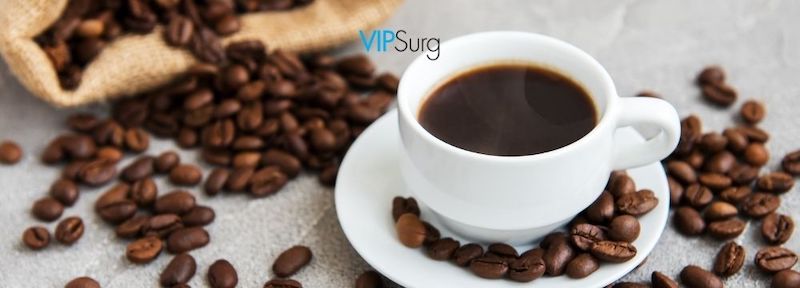Does Caffeine Help or Hinder Weight Loss; And What Effects Does It Have Post-Bariatric Surgery?

There are a few things that most of us can’t live without. Fresh air, water, TV binge-watching, our families, and coffee. Maybe not in that order.
Some of us love the taste of coffee, others are pretty sure they’re dependent on the caffeine pick-me-up, while others have gotten used to it as an integral part of their daily ritual. However, coffee and caffeine fit into your life, there’s no denying it holds a significant impact and is likely one that’s hard to give up. But does it need to be given up, and how does it fit in when we’re trying to lose weight or living the post-bariatric surgery lifestyle?
While there Is no concrete evidence that caffeine either helps or hinders his weight loss, there are plenty of studies that can argue how it fits in with a healthy lifestyle.
Working Out
First, do you know caffeine is the primary stimulant and coffee or tea and with it can come an increase in energy, alertness, and attention? While we like to endorse a huge glass of water as a secret weapon when you’re dragging – (try it and prove us wrong) – we also understand that some of you cannot possibly get moving without the strong stuff. A caffeinated before a workout has been shown to give a boost. But there are two sides to the coin. Too much caffeine can cause jitters, affect sleep patterns, and can increase heart rate to the point where they may feel palpitations.
So consuming caffeine no more than an hour before your work out could enhance your performance, push you a little further, help keep your focus, and psychologically keep you in the game knowing you didn’t deprive yourself. So, yes, caffeine as a stimulant can help you pre-work out, which in turn, will help you shed some pounds.
Post workout it is best to consume lots of water and avoid the caffeine which can be exceptionally dehydrating.
Drop The Sugar and Flavors
There are numerous studies that cite the benefits of your morning cup of coffee, but it’s important to stress that these coffees are not the ones with drizzled caramel, or made with condensed milk, syrups, flavors, or whipped cream oozing out. Be mindful of sugar intake, but also avoid the artificial sweeteners in your beverages. Artificial sweeteners, while far lower in calories, trick your body into craving sugar, just as much as sugar, if not more intensely.
Resting Metabolic Rate
So, in one way caffeine can be linked to weight loss if it is timed before a workout. But what if we’re not working out? At rest, can caffeine stimulate our systems enough to shed calories? The simple answer is that caffeine does increase our resting metabolic rate. But in truth, this increase is so minimal that one can’t argue that it is at all beneficial to losing weight. In moderation, caffeine can be part of a very healthy lifestyle, but relying on it to do anything more than enhance your outlook mood and energy it’s probably wishful thinking.
Pre- and Post-Surgery
What if you are a bariatric surgery patient? Pre-surgery, you will be asked to stay away from stimulants and hydrate with water and avoid sugars often found in some of our favorite caffeinated beverages.
Post-surgery, our bodies will require hydration, and caffeine is a known diuretic. This means that it flushes water out of the system, making it harder to get sufficient hydration each day. As you may know, hydration is key for to success for a postop bariatric patient. Patients should be consuming at least 64 ounces of water each day. For this reason and others, patients will not be allowed to drink caffeinated beverages within the first 4 to 6 weeks after surgery.
Moreover, caffeine is often found in some of our favorite sodas, and carbonation is a huge red flag for post bariatric surgery patients. It’s important that they have patients avoid carbonation as it can irritate and even stretch the new stomach pouch. While this rarely causes long-term complications, it can cause short-term pain leading to consumption of too few calories.
Does this mean that we can’t enjoy a caffeinated beverage post-surgery? Since we are on a journey to embrace and appreciate moderation, we hesitate to say all caffeine must be eliminated. If a person is hydrating very well with water, limiting sugar and carbonation intake, a cup of coffee or tea can have a place in the rotation.
So, the verdict is that our favorite warm beverages may still have a place in our lives as long as we moderate.



